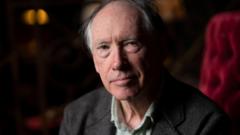Can Ian McEwan Explain How Humankind Will Survive?

Published: 2025-09-08 15:18:04 | Category: technology
In a recent interview, renowned British author Ian McEwan shared his insights into the pressing issues of climate change and the resilience of nature, as well as his reflections on the state of contemporary society. He emphasised a hopeful perspective on humanity's future, especially in light of his new novel, *What We Can Know*, which imagines a future UK partially submerged due to rising sea levels. McEwan believes that while the challenges are significant, nature's ability to recover offers a glimmer of hope.
Last updated: 02 October 2023 (BST)
Key Takeaways
- Ian McEwan's new book, *What We Can Know*, explores a future affected by climate change.
- He expresses hope for humanity's resilience and nature's capacity to recover.
- The novel features a character searching for a lost poem in a submerged UK.
- McEwan critiques modern communication and censorship, highlighting concerns over free speech.
- He contrasts the depth of past literature with today's brevity.
Climate Change and Human Resilience
As global temperatures continue to rise due to human activities, the effects of climate change are becoming more pronounced. McEwan's reflections come at a time when many scientists warn of the dire consequences of inaction. However, he maintains an optimistic outlook, pointing to various "pinpoints of light" across the globe—initiatives that focus on rewilding and ecological restoration. He believes that these small yet significant projects illustrate nature's remarkable resilience and capacity for recovery when given a chance.
Nature's Recovery: A Beacon of Hope
According to McEwan, the regenerative power of nature is astounding. He noted that many biologists are amazed at how swiftly ecosystems can bounce back if humans cease harmful practices. This perspective is essential as it highlights that while the situation may seem bleak, there are pathways to recovery if society commits to sustainable practices. He argues that this balance is crucial, particularly for communities that rely on natural resources for their livelihoods.
Exploring the Future in *What We Can Know*
McEwan's novel, set in 2119, serves as a cautionary tale about the potential consequences of current environmental neglect. The narrative follows Tom Metcalfe, an academic researcher on a quest to uncover a long-lost poem from the present day. This search unfolds against a backdrop of significant ecological loss, as many species and plants have disappeared due to climate change. The submerged lowlands of the UK serve as a powerful symbol of what is at stake if current trends continue.
Dialogue Between Past, Present, and Future
One of McEwan's ambitions for the novel is to create a dialogue across time, merging the past, present, and future. He reflects on how future historians might view our era with a mix of dismay and envy, acknowledging the wonderful aspects of modern civilisation that may be lost. The book not only examines the ecological consequences of our actions but also delves into the complexities of human relationships, particularly through the character of Vivien, Metcalfe’s obsession with the lost poem intertwining their narratives.
Contemporary Issues: Censorship and Free Speech
In addition to his views on climate change, McEwan has recently spoken about contemporary issues surrounding censorship and free speech, particularly in the context of the arrest of comedy writer Graham Linehan. Linehan's arrest, which involved armed police, has ignited debates about the balance between protecting free speech and addressing potential threats. McEwan expressed concern over the heavy-handed nature of the police response, suggesting that while safety should be a priority, the methods employed can sometimes seem excessive.
The Evolution of Communication
McEwan also touched on the changing nature of communication in the digital age. He lamented how modern correspondence, often limited to brief emails and social media posts, lacks the depth and insight found in historical letters written by figures like Napoleon and Darwin. This shift in communication style raises questions about how we convey complex thoughts and emotions in an increasingly fast-paced world.
What Lies Ahead for Humanity and Literature
As McEwan grapples with these pressing themes in his work, he invites readers to consider the legacy of our actions today. His narrative serves not only as a reflection on the potential consequences of climate change but also as a meditation on the enduring power of literature and the human spirit. The hope is that future generations will not only learn from our mistakes but also celebrate the achievements and beauty of our civilization, even in the face of adversity.
Ultimately, McEwan's insights resonate deeply in today's context, reminding us of the importance of taking action while fostering an appreciation for the resilience of nature and humanity alike. As we navigate these tumultuous times, the question remains: How can we collectively ensure a thriving future for both our planet and ourselves?
FAQs
What is the main theme of Ian McEwan's new book, *What We Can Know*?
The main theme revolves around climate change and its impact on future societies, exploring how humanity might adapt and recover in a world significantly altered by ecological disaster.
How does McEwan view the current state of free speech?
McEwan expresses concern over censorship and the heavy-handedness of law enforcement regarding free speech issues, advocating for a balanced approach that protects individual expression while ensuring public safety.
What does McEwan mean by "the derangement" in his novel?
"The derangement" refers to the collective failure to act decisively against climate change despite being aware of its consequences, highlighting the disconnect between knowledge and action.
How does the character Tom Metcalfe contribute to the story?
Tom Metcalfe serves as a lens through which readers explore the future, as he searches for a lost poem, reflecting on the cultural and historical significance of literature in a changing world.
What message does McEwan hope to convey about nature's resilience?
McEwan aims to highlight that nature has an extraordinary ability to recover if humans halt harmful practices, offering hope that ecological restoration is possible with concerted efforts.



